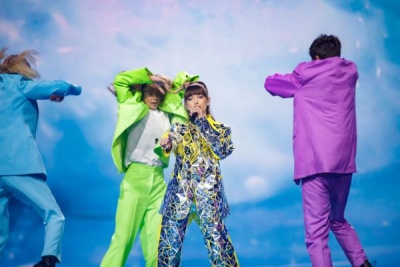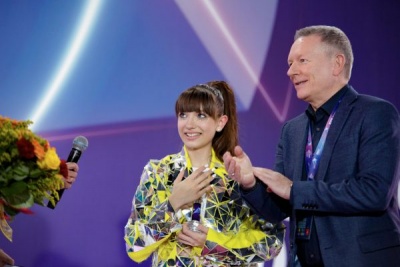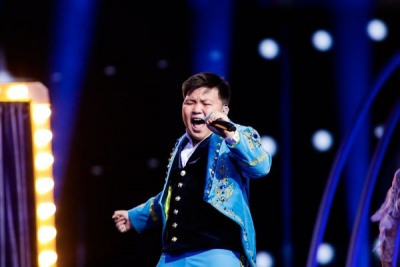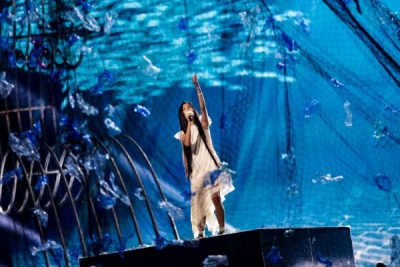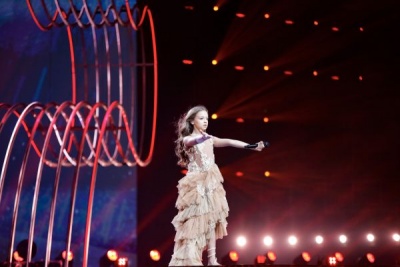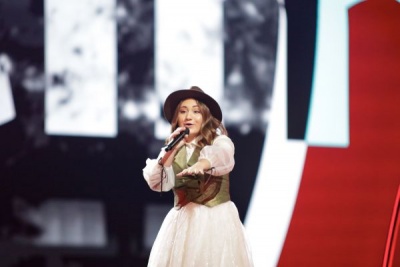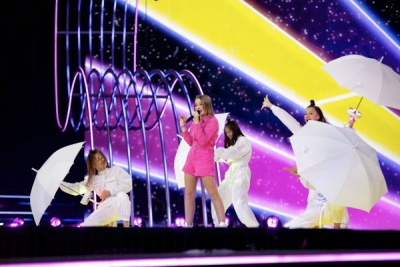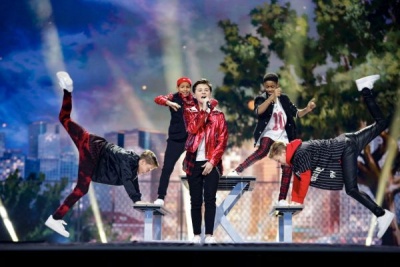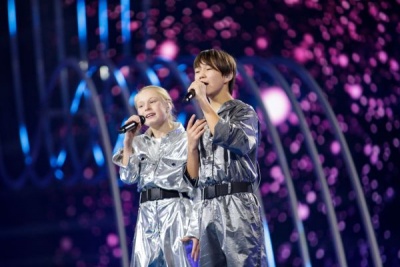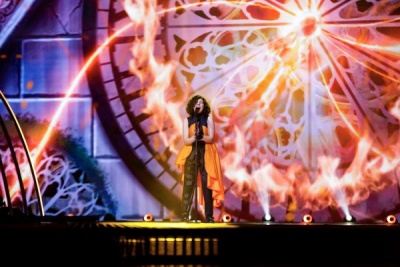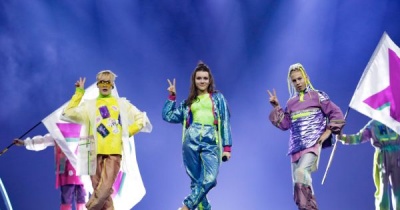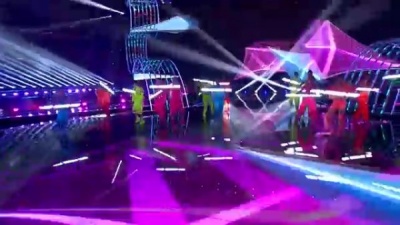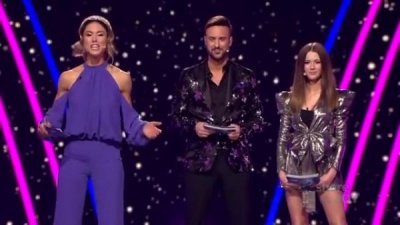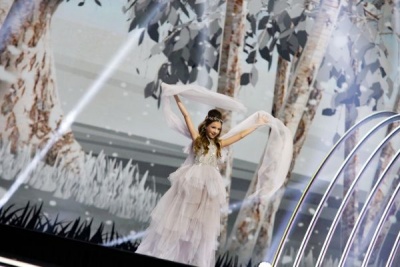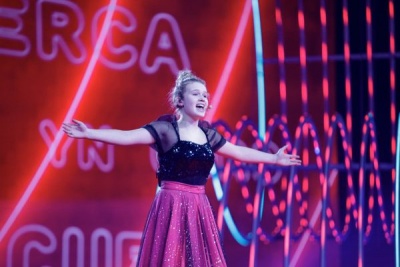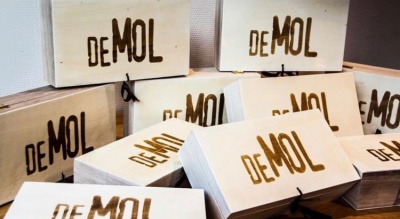Weaver's Week 2019-12-01
Last week | Weaver's Week Index | Next week
This week, we go to darkest Silesia, to share the joy in a demonstration of lighting technology. Yes, it's time for another madcap opening sequence, it's
Contents |
Junior Eurovision Song Contest 2019
TVP for EBU, on S4C and Fun Kids Radio, 24 November
Yes, brighten up your dark evenings with the latest hand-held portable fluorescent lights in darkest Silesia. The opening sequence is the usual mix of choreography and people walking on with confidence (or fear).
Let's start with the winner. "Superstar", performed by Viki Gabor, representing TVP (Poland). Home field advantage came through for this song – it's been a top ten airplay hit for the past month, as popular as "Dance monkey" or the new one from Camila Cabello. The show went out on TVP's main channel, and we understand it provided something like 5 million viewers. That's likely to be a substantial proportion of the entire audience.
So, viewer at home, here's a song you're familiar with, you hear it on the radio every day. You can express your support for the song – and for your flag, if you're so inclined – by a simple internet vote. By a simple and free internet vote. A lot of people did; there were more than three times as many individual votes as last year, and we reckon a million of those votes gave a tick to "Superstar".
Could TVP have won by sending any old tripe? No; they had to have a lot of support from the juries as well. "Superstar" was second in the jury vote, a mere 36 points adrift of the lead. Even with the commanding win in the audience vote, if the juries had not liked the song – put it tenth rather than second – we wouldn't be talking about another win for TVP. Just as last year, the juries confirmed that the popular vote winner was of high quality.
"Superstar" is a representation of contemporary radio-friendly European pop music. It's a minor-key number, in the grouchy-pop tempo we've grown to recognise (if not love) these last few years. For our money, the song falls down through a lack of originality: it's got exactly the same structure as last year's winner "Anyone I want to be".
Roksana's winner from last year's Junior Eurovision began with a throbbing chord, a solo vocal in English that turned into Polish for the pre-chorus. Back to English for the chorus, hook viewers with the loping beat and fists-in-the-air moment. The second verse is entirely in Polish, the second pre-chorus and chorus is entirely in Polish, but we know what she's singing. Then there's a middle eight with some language-free moaning and wailing, the pre-chorus is almost an instrumental, and we're back into English for the last chorus.
But no! The last chorus chops off half-way through! Darn you! Our expectation is denied, the moment of catharsis we've come to expect is not going to happen! The only way to get resolution is to play the song again, in the winner's reprise.
And this year, "Superstar" followed exactly the same pattern. Throbbing "na na na na nas", a solo vocal in English, turning to Polish for the pre-chorus, and back to English for the first chorus. Then a second verse and chorus in Polish, a language-free middle eight, and half a chorus to finish.
Massive congratulations to TVP for winning the contest again, and massive congrats to the songwriters for winning the contest again with what is – in many ways – the same formula as last year. This column included TVP's entry in the long list of ones we might vote for, but quickly scrubbed it off before the first recap began.
Where is Kazakhstan?
"Armanynnan qalma" came second for Khabar Agency, a one-place improvement from their debut last year. Yerzhan Maxim was on immediately before Viki, and couldn't have made a bigger contrast. He's a short lad, dressed in a smart outfit, to which he added a jacket in the same colours as the flag.
The stage show is captivating, with shadow puppets and dancing fairies. It's like a Disney musical number, the one from two-thirds of the way through where our despondent hero is this close to giving up. And young Yerzhan can sing tremendously well, the best vocals of the night. The juries agreed, they ranked him top of the board, and only a mid-table televote allowed the hosts to overtake.
This is why we watch Junior Eurovision. When a song hits the right points, it transcends language, it moves past national boundaries. We couldn't understand a word of what Yerzhan was singing about, but by golly we understood what he was putting across on our screens.
The environmentally-friendly contest
"Marte" came third for Melani Garcia, representing TVE (Spain). Opera beneath the sea, set in a big stage full of fishing nets and plastic detritus. There's a lot to like about this entry, Melani is a technical singer, able to hit the high notes perfectly, and still tell her story. The stage design was a high concept, perhaps distracted us from the vocal ability.
Why didn't TVE win the contest? It wasn't quite as impressive as Yerzhan, perhaps the staging was just too literal for its own good. Juries were asked to compare the two performances, and preferred the lad from Kazakhstan. Viewers liked it, and put "Marte" a clear second. But it's churlish to say that TVE didn't win: this was their return to Junior Eurovision after many years away, and third place is a tremendous achievement.
It did do better than "Vem comigo", Joana Almedia's entry for RTP (Portugal). Again, the environmental message was not subtle, with slogans on the backdrop. There was a threatening lyric: "time is running out to save the earth, it's time to wake up, I can't make it alone". Compare that to the positive messages from other competitors – "we are the superheroes", "raise your voice make some noise", which we found more fitting with the JESC atmosphere. Joana was undone by some particularly weak vocals, and the lack of a neighbourly vote meant the song scored nothing from the juries.
A more subtle eco-message came from Marta Viola and her entry "La voce della terra" for RAI (Italy). There was a lovely cut as she sung the chorus line: "sempre, sempre", and there were uplifting chords and a more strident marching tempo. The gentle positivism contrasted well with the immediately prior entry from RTP.
We file "Podigni glas" from Darija Vracevic in the "eco-friendly" category, though it was as much of a song about inspiring people to take action. This was the final song performed, and went out with a bang – cracked mirrors on a red background, this is a song for revolution. Darija owned the stage, and commanded the key change by the sheer power of her arms. This was the "raise your voice, make some noise" song, from RTS (Serbia). Both this and RAI were mid-table songs, picking up a few points from almost every jury, and a medium number of televotes.
Someone has to finish last, and this year it was "We are more" from Eliana Gomez Blanco. Not quite sure why this didn't connect, perhaps it was overtaken in viewers' minds by the entry from Darija, or memory-holed by the strong performance from Yerzhan immediately afterwards. Perhaps it was the lyric video playing on the backing screen: rather than give a visual accompaniment, we're slammed with the words in English. It's a great song – we'll be adding it to our Generic Fruit-Based Playlist – but not a great competition song.
We could say the same thing about "The spirit of music", Sofia Ivanko's song. And we mean that quite literally: she wrote the piece, performed it, and owned it far more than anyone from NTU (Ukraine). It was a pleasant enough little song, meandered along with plenty of bird noises, but left us with no reason to vote.
Pre-contest faves
"Bim bam toi" from Carla was expected to do tremendously well, and finished in fifth place. It's a nonsense song, all the chaos and unpredictability of hormones! puberty! love and crushes! The song was entirely in French, even the bits in Nonsense, sung wonderfully and presented just as well. If you expect glitter and childish things from Junior Eurovision, this from France Télévisions is the entry to look up. It stood out precisely because it was the only song dealing in glitter and childish things.
"We will rise" had opened the contest, performed by Jordan Anthony. It's literally true, Jordan is over six feet tall, and co-wrote this song himself. It's very much in the style of César Sampson's "Nobody but you" from the senior contest, all gospel and empowerment and overcoming adversity through inner strength. ABC Kids (Australia) were also in the mid-table mix.
"Dans met jou" left us wondering if AVROTROS (The Netherlands) could do the double; Matheu was the performer. He came with his own branded medium-sized picnic table, medium-sized climbing frame, and medium-sized gang of four friends. The song effortlessly swapped from Nederlands als Engels in het middleje van de lijn en back again without missing a beat. It's a sprightly performance, full of the joys of life, specifically the joys that you promise. Didn't win, but fourth place is nothing to sneeze at.
Overseas entries
"Vremya dlya nas" was the entry from Tatyana Mezhentseva and Oorzhak Denberel, the only duet of the night. Oorzhak had had a bad throat all week, and sounded very hoarse and husky all week. Tatyana's voice was crystal-clear, but couldn't quite carry the song on her own. Had Oorzhak been in better health, Channel One Russia would have finished above 13th place; we think they were right to decline a re-sing on the Sunday, as Oorzhak's voice might not have held up.
Great news for Jeremy Vine: Mila Moskov has broken your swingometer, shattering it into a million tiny pieces while performing "Fire". It's an intense song from MKRTV (North Macedonia), catnip for the juries, but relegated to sixth by a poor televote.
"We need love" sang Giorgi Rostiashvili, a jazz-funk number that went ba-da-ba-baaaa like he's introducing an advert break in the cinemas of the 1950s. Like on Top of the Pops from the mid-80s, there were real balloons in the crowd, just minutes after Melani had lectured us about the waste in the sea. Fourteenth place makes it the worst performance at Junior Eurovision by GBP (Georgia); perhaps they might like to avoid yellow jackets.
"Pepelniy" followed immediately for Liza Misnikova. It's very much the advertiser's dream of teenage life, all neon t-shirts and silver jackets and lots of energy. In a good way, the song reminded us of BTRC (Belarus)'s entry to Senior Eurovision this spring, and the result was about the same: mid-table eleventh.
After we'd heard the memorable entries from Matheu and Marta, the next couple of songs seemed to fall through the cracks. "Colours of your dream" was Karina Ignatyan's entry. A giant castle on the backdrop, quality singing and a funky rhythm, cute staging, with just enough ethnic touch to make it clear this was from AMPTV (Armenia). The diaspora vote is diluted by the internet voting, and the song finished 9th overall.
Then came "Mikja ime fëmijëri" (My childhood friend) performed by Isea Çili. It's a pretty song, had plenty for the juries, but didn't have a clear call to action. The juries didn't deliver their votes, the internet left it on the side, and 17th place overall for SHTV (Albania).
Behind the scenes, the media didn't get to see first rehearsals on Tuesday and Wednesday, the children were allowed to find their way around the stage on their own. This experiment was generally welcomed by the media – it fits into the general "be pleasant to the children" vibe. Eurovision big cheese Jon Ola Sand intimated they wouldn't completely block media coverage from early Senior Eurovision rehearsals, but might restrict it.
TVP's television show was as slick and glossy as we'd expect. A massive crowd, a huge stage, a bigger LED display. This was a tremendous show to watch, the atmosphere came through the set. As was traditional, the three hosts were Woman In The Green Room, and Competent Bloke, and Last Year's Winner To Gad About. S4C included two breaks in the first half of the show, omitting the chat in the green room, and editing straight past the third ad break. They also omitted the second vote recap and most of the common song – can't spoil the routine for Chwilio am Seren 2022.
This column is accountable for its votes. On Saturday, we voted for the ones that had impressed us most in the 15-second recap reel, the ones we were most excited to see in full on Sunday: "Bim bam toi", "Fire", "Calon yn curo", "Banshee", and "Podigni glas". After the performances, this column voted for the songs we wanted to see again: "Bim bam toi", "Fire", and "Banshee" retained their places, joined now by "Pepelny" and "La voce della terra".
Our Celtic friends
Which leaves two to cover. "Banshee" performed by Anna Kearney, representing TG4 (Ireland). Anna's mother was part of the original Riverdance performance, and we can see a faint similarity with the 1994 contest winner. It began in the most calm and quiet way, a piece of choral music playing over clichéd images of Irish castles and greenery; then they cut back to The Point theatre, Michael Flatley took to the stage, and the rest is history.
"Banshee" also starts in a calm and quiet way, an ethereal young woman in white, performing a lilting melody over a clichéd backdrop of forests and water. And then it all turns to the dark side: wings cross the screen, and what sounded like a twee song barking back to an ancient culture suddenly becomes modern and vital and angry. It's a song about facing your demons, through the metaphor of a literal demon that's meant to appear to people near their death. And it's a catchy number: even before the end of the song, we've humming along with the tones of the chorus, the only time we did that all night. Twelfth place: deserved better.
"Calon yn curo" was performed by Erin Mai for S4C (Wales). It finished 18th, and sadly that wasn't an undeserved outcome. The song is about the rush of excitement before a big moment, the big bundle of nerves turning into something productive. If this were a radio contest, we reckon S4C would be there or thereabouts, there was nothing wrong with Erin's singing, there was nothing wrong with the song.
It's the staging that didn't work so well. Your song is called "Heart beating", so we can guess the backdrop; unlike "Banshee", this song doesn't subvert its clichés. Erin stays on her mark, and remains solo until the second chorus. Since the national final in Llandudno, they've added a fiddle part to the mix, which doesn't work for this column. And we really didn't like the way her dress unfolded into a butterfly effect: it looked naff when BTRC did it at Senior Eurovision around the time Erin was born.
Overall, though, S4C can be pleased with the result. They've shown their faces in Europe, they've promoted Welsh to 25 million viewers, their plan to climb the table two places a year means we should be in Newport by 2028 (so set out from Paddington right now). Junior Eurovision is still a learning curve for S4C, and we can see artistic progress from last year's twee entry. Keep it up, and great things are in sight.
This Week and Next
We're sorry to report the death of Clive James, television critic. Born Vivian Leopold James in 1939, he became famous through some witty, acerbic, thought-provoking, and sharp analysis of television for The Observer between 1977 and 1982. Later, he'd present the chat show Saturday Night Clive and the landmark series Fame in the 20th Century. A tour of the planet's more bizarre shows – Clive James On Television – contributed to the popularity of Takeshi's Castle. An inspiration to everyone who writes about television, including this column. Clive had been ill for many years, and died last Sunday.
We're also sorry to report the death of Gary Rhodes, television chef. He opened City Rhodes in London in 1997, and quickly rose to prominence on the cookery series Rhodes Around Britain. He was a familiar and much-loved contributor to Masterchef and to Hell's Kitchen. At the height of his career Rhodes had restaurants aboard cruise ships, in the Middle East, and the Caribbean. Gary died on Tuesday, aged 59.
You know how the BBC livens up our August by drip-feeding names for Strictly Come Dancing? And how they drop the names absolutely everywhere, obvious places like The One Show and Breakfast Time, obscure places like the Radio 3 Afternoon Concert?
The producers for Wie is de Mol have heard about this and thought, we can do even better. On Monday, they posted out 10 little wooden boxes to various media channels, each containing a name for the new year's series. All of the other broadcasting organisations – RTL, MAX, KIKA – got a box, and a little bit of an exclusive for their viewers or listeners. So did net publication AD.nl, and LINDA magazine. (We were sad to learn that LINDA is a fashion mag, and not a detective magazine edited by a sheep in stripey socks.)
Our takeaway from this story: Wie is de Mol is a huge cultural phenomenon. The BBC can put its Strictly announcements anywhere, but only on its own shows. Strictly isn't big enough to barge its way onto ITV or Channel 4 shows. WIDM gets everywhere, rival broadcasters are prepared to give publicity because they'd look petty if they refused.
BARB ratings in the week to 17 November.
- Television has a new number one: I'm a Celebrity... Get Me Out of Here! (ITV, Sun, 13.15m). Strictly Come Dancing had a series peak (BBC1, Sat, 11.5m). Seven Worlds One Planet (BBC1, Sun, 8.3m) is the top non-game, His Dark Materials (BBC1, Sun, 7.2m) the top drama.
- The Wall closed with 4.7m (BBC1, Sat), growing by more than a million over the series. The Chase Celebrity with I'm a Celeb stars did excellent business (ITV, Sun, 4.65m) – the best audience for any episode of The Chase all year, fully 50,000 ahead of the daytime best. Pointless Celebrities powered to 3.85m (BBC1, Sat), and good numbers for returning series Cash Trapped (ITV, Mon, 3.75m) and The Hit List (BBC1, Sat, 3.6m).
- Masterchef The Professionals continues to rule BBC2 (Tue, 3.5m), and is now more popular than The X Factor (ITV, Sat, 3.1m). Tipping Point is close behind (ITV, Thu, 2.7m). Back on BBC2, Only Connect (Mon, 2.45m) ahead of University Challenge (Mon, 2.25m), with Dragons' Den Does I'll Get This pulling 1.75m (Fri).
- Junior Bake Off was the only game on Channel 4 (1.6m, Mon), and a tip of the hat to Richard Osman's House of Games (3) (BBC2, Mon, 1.5m), a record audience there.
- Top digital show was I'm a Celebrity Extra Camp (ITV2, Sun, 1.12m), followed by Celebrity Juice (ITV2, Thu, 855,000) and I'm a Celeb Surviving the Jungle (ITV2, Wed, 635,000). Top game show on any other channel was Gigglequiz (Cbeebies, Mon, 415,000). Another intellectual show, Celebrity Countdown, attracted 245,000 (More4, Tue).
Be careful this week, as Quote... Unquote (Radio 4, Mon) might get into your ears. More tastefully, we have the Landscape Artist of the Year final (Artsworld, Tue).
Photo credits: TVP / EBU / Thomas Hanses, Avrotros.


